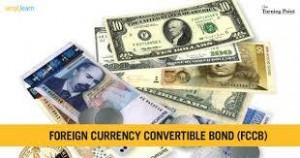In this blog post, Hitender Sharma, who is currently pursuing a Diploma in Entrepreneurship Administration and Business Laws from NUJS, Kolkata, discusses whether funds received by the Indian Company vide issuance of DRs and FCCBs are treated as FDI.
What is Depository Receipt (DR)?
- Depository Receipt means a negotiable security issued outside India by a Depository Bank, on behalf of an Indian company, which represent the local Rupee denominated equity shares of the company held as deposit by a custodian bank in India.
- An Indian company may issue its Rupee denominated shares to a person resident outside India being a depository for the purpose of issuing Depository Receipts , provided the Indian company issuing such shares has an approval from the Ministry of Finance, Government of India to issue such DRs or is eligible to issue DRs in terms of the relevant scheme in force or notification issued by the Ministry of Finance, and is not otherwise ineligible to issue shares to persons resident outside India in terms of these Regulations, and the DRs are issued in accordance with the scheme for issue of Foreign Currency Convertible Bonds and Ordinary Shares (Through Depository Receipt Mechanism) Scheme, 1993 and guidelines issued by the Central Government there under from time to time.
Process of issue of Depository Receipt (DR)
- When an Indian company wants to create a depository receipt abroad, the company will generally hire an Advisor to understand the relevant regulations, and will then choose a domestic custodian Bank.
- The company will decide how many shares will be represented by the depository receipt, referred to as the depository receipt ratio, and will find a broker in the selected foreign country willing to purchase the shares to be held by the custodian bank.
- A broker in the selected foreign country will purchase shares of the Indian company, and then the domestic bank will register the shares on behalf of the broker.
- Once the Bank issues depository receipts, the foreign broker can have the shares listed on a local exchange in the foreign country, such as the New York Stock Exchange, as a DR and can sell those shares domestically.
Form of Depository Receipt
There are two forms of depository receipts.
- American Depository Receipt ( ADR )
Depository Receipt listed and traded on exchanges based in the United States are called the American Depository Receipt.
2. Global Depository Receipt (GDR)
Depository Receipt listed and traded on Stock exchanges based in non-U.S. markets such as London and Singapore are called Global Depository Receipt.
What are Foreign Currency Convertible Bonds (FCCBs)?
‘Foreign Currency Convertible Bond’ (FCCB) means a bond issued by an Indian company, expressed in foreign currency, the principal and interest of which is payable in foreign currency and convertible into ordinary shares of the issuing company in any manner, either in whole, or in part.
FCCBs are issued in accordance with the Foreign Currency Convertible Bonds and ordinary shares (through depository receipt mechanism) Scheme, 1993 and subscribed by a non-resident entity in foreign currency.
What is Foreign Direct Investment (FDI)?
- FDI means investment by Non-Resident entity/ person Resident Outside India in the capital of an Indian company in accordance with schedule 1 of Foreign Exchange management ( Transfer or issue of security by a person Resident outside India) Regulations, 2000.
- Foreign investment is recognized as FDI only if the investment is made:
- in equity shares,
- fully and mandatorily convertible preference shares
- and fully and mandatorily convertible debentures
- FDI policy does not permit issuance of any optionally convertible security.
- The FDI policy provides that the pricing of the securities to be issued to the foreign investors should be decided upfront as a figure or based on the formula that is decided upfront.
- The FDI policy also provides that the price at the time of conversion should not in any case be lower than the fair value worked out, at the time of issuance of such instruments, in accordance with the extant FEMA regulations [valuation as per any internationally accepted pricing methodology on arm’s length basis for the unlisted companies and valuation in terms of SEBI (ICDR) Regulations, for the listed companies] without any assured return.
- Reserve Bank of India (RBI) has put in place a specific pricing mechanism according to which the above mentioned eligible securities can be issued to the foreign investors. Therefore an Indian company cannot issue securities on such terms that foreign investor may exit with pre-determined returns.
- Any security allowing assured returns would be considered debt and will not be considered as FDI.
- Partly paid equity shares and warrants issued by an Indian company in accordance with the provision of the Companies Act, 2013 and the SEBI guidelines, as applicable, are also treated as eligible FDI instruments w.e.f. July 8, 2014 subject to compliance with FDI scheme.
- Any foreign investment into an instrument issued by an Indian company which gives an option to the investor to convert or not to convert it into equity or does not involve upfront pricing of the instrument as a date would be considered as ECB and would have to comply with the ECB guidelines.
Procedure for receiving Foreign Direct Investment in an Indian company
An Indian company may receive Foreign Direct Investment under the two routes as given under:
i) Automatic Route
FDI is allowed under the automatic route without prior approval either of the Government or the Reserve Bank of India in all activities/sectors as specified in the consolidated FDI Policy, issued by the Government of India from time to time.
ii) Government Route
FDI in activities not covered under the automatic route requires prior approval of the Government which are considered by the Foreign Investment Promotion Board (FIPB), Department of Economic Affairs, Ministry of Finance..
The Indian company having received FDI either under the Automatic route or the Government route is required to comply with provisions of the FDI policy including reporting the FDI to the Reserve Bank as prescribed.
Whether investment in the form of DRs and FCCBs is treated as investment?
- Now the question as to whether the funds received by the Indian company vide issuance of DRs and FCCBs are treated as FDI or not is to be examined in the light of FDI policy.
- Foreign investment is recognized as FDI only if the investment is made in equity shares, fully and mandatorily convertible preference shares and fully and mandatorily convertible debentures only. FDI policy does not permit issuance of any optionally convertible security as mentioned above.
- There is a specific pricing mechanism put in place by RBI for issuance of securities to the foreign investors.
- The policy objective is not to allow any assured return to the foreign investors and the investment should be in the form of equity share upfront of other instrument convertible in to equity share over a period of time as per the policy.
- DRs and FCCBs pass these tests as provided in the FDI policy. DRs are basically foreign investment in the form of equity shares issued outside India by a Depository Bank, on behalf of an Indian company which is covered under the FDI policy. Similarly FCCBs are foreign currency convertible Bonds invested in Indian company. Since these bonds are convertible in to equity shares over a period of time as provided in the instrument, therefore they are covered under FDI policy.
Therefore, inward remittances received by the Indian company vide issuance of DRs and FCCBs are treated as FDI and counted towards FDI.
 Serato DJ Crack 2025Serato DJ PRO Crack
Serato DJ Crack 2025Serato DJ PRO Crack












 Allow notifications
Allow notifications



FCCBs are in no way relevant to FDI. In fact FEMA 20(R) makes it clear that FCCBs and DRs which have underlying debt instruments are not to be included for the purpose of calculation of total FDI or breach of sectoral cap. Additionally, FCCBs are included under FYC denominated ECB under Master Directions on External Commercial Borrowings, Trade Credits and Structured Obligations.